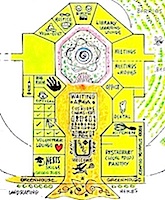






 |
 |
 |
 |
 |
  |
| PAUL
GLOVER ESSAYS: community
control of food, fuel, housing, health care,
planning, education, finance. |
| HOME | INTRO | CURRENCY | SUCCESSES | HOW-TO BOOK | PUBLICITY | ESSAYS |
|
Ithacans
Who
Tune In by Turning TV Off by Paul Glover, The Grapevine,
March 1987
Wayne and Jean Nowack rise and shine before the sun does, to watch dawn. "Wonderful streaks and billows of red" light their breakfast. Afterward, from 6:00 to 7:30am, he reads aloud to her while she spins wool. They have done so throughout their 34-year marriage. If they are not working together, she caning chairs and he painting landscapes, they are hiking with their two dogs, visiting museums, sampling free concerts, shopping for antique records and books. As they garden, raising all their fruits and vegetables, they might discuss their morning reading. Deer come close by them. Most warm evenings they rest on their backs in the grass, to watch the stars and moon. The Nowacks have filled their lives with with experiences. But they have not experienced television. "We've never had TV, and probably haven't seen 70 shows in our entire lives," says Jean. "We watched the Army-McCarthy hearings in 1954, and saw Laugh-In at a friends' long ago." These two Danby residents are among the few hundreds in Tompkins County who've never seen Miami Vice, Bill Cosby, 60 Minutes or Murder She Wrote. The latest Nielsen report finds 98 percent of U.S. households use at least one TV, seven hours daily. Television is so important to nearly every American, it is hard for most to imagine how anyone lives without it, or why. Yet right here in Ithaca, and from Podunk to Slaterville Springs, we have neighbors living non-video lives. Two years ago Janice and Ben Holst made a New Year's resolution of independence and sold their TV. "It turned our lives around completely; it was just about the best thing we ever did," recalls Janice. "We were depressed, I was overweight, and everybody on TV was having so much fun. We took a look at ourselves and decided to live instead of watching other people live. It was the hardest thing I ever did, to face myself after turning TV off, but within a week we started to feel better. I went to a health club and lost 30 pounds in two months. We took up cross-country skiing and bicycling went camping. And instead of just staring at TV, we started looking at each other and talking in a really intense way about how we felt about everything. We started making some goals and putting them into action." Chris and Susan Peterson and their eight children are also too busy for televisoin. He is a chef and she is a mother who refuses to let television babysit her youngsters. They take walks together, talk together, play checkers, build things, invent things, make dolls, read, write, hunt bugs and snakes. For several years they educated their children at home, by incorporating as a church school. The kids were so excited by what they learned that an entire room was given to their Clay Kingdom, where many extra hours of history, biology and social studies lessons were modeled in detailed clay figures. Then someone gave them a television. "I have photos of my kids sitting in chairs, with vacant eyes. They were obsessed with their favorite program," says Susan. The set finally broke and they trashed it. Nine years later their three oldest kids are honors students. Marta Macbeth grew up glued to television: "I ran my life by TV Guide." Now she, her husband Jim and two kids enjoy Ithaca's parks, concerts, sports, dance classes, theater and library. They draw, fantasize, play games. There's not a whole lot of time to be bored," she says. "If the kids don't know what to do, I start them off on something. Rather than just saying 'go play, go play,' I take a few minutes. Our lives are really complete without TV. Our seven-year-old says he doesn't want one." Cathy Tucker contrasts our television culture with the "rich social network" of West Africa, where she was a Peace Corps volunteer. There are no televisions, but every night families gather around fires for hours of storytelling. Young and old practice the art. One night, she remembers, a grandmother danced a sword dance no one had seen for decades. In the U.S., she says, "TV shows are so violent and people are so used to it they don't even notice." Her husband Gabe feels TV "robs the imagination because it doesn't require people to think or imagine," as books, radio and real life do. Maria Cowan's kids can listen intently to storytelling by the hour. They've never seen a TV show or movie. As a former elementary school teacher, she notes that TV kids have less patience for stories, needing fast visual action. Richard Iverson left his television set in New York city when he came to Ithaca, and discovdeed there's a whole life west of the Hudson River and lie without television. So many Ithacans have discarded their televisions, in fact, that the Grapevine's invitation to describe life after TV prompted over 50 calls. All offered distinct reasons for their choice. Here's further summary of our conversations: Breaking the National Hypnosis "When I was young we were allowed to watch just two hours a week," says Leslie Aplan-Wharton. "I hated that, but I'm glad now." When she and her carpenter husband Mark gave away their doclor TV three years ago, they set themselves free of the "brainless stupid shows and depressing news" they couldn't stand. "Why waste energy turning in car accidents in Syracuse?" asks Leslie. "It's better to help a neighbor or friend." Joey Cardemon agrees. "It's not as if we're intellectuals. We're just living. Without television we have time to interact, daydream, be bored, hang around talking by the wood stove. People watch TV as a way to avoid each other. We get to know each other." A teacher of remedial writing at Ithaca High, she feels that "it's better to stare out the window or play in the dirt than to watch the most 'educational' TV show." As a "rabid TV hater," she was thrilled to hear about the Society for the Eradication of Television (SET), which [published] "SET Free" quarterly. Even after 16 years without television, Mark Walker and Tia Rudd still recall TV's appeal. "Some evenings when we're tired and don't feel like doing anything, but it's too early to go to bed, we just want to be entertained, " says Tia. "But we get up and do something anyway, like sew or build furniture." Mark explains, "If we had a TV we'd watch it a little, then a little more, then a lot." |
Mary
Moon actually felt embarrassed to watch actors on TV do such "silly,
trivial, inconsequential, boring things. Communication should
enhance
rather than degrade people." Most non-video Ithacans in this article get their news from National Public Radio, the Sunday New York Tmes, and the local weekly papers. Few take a daily paper, yet they feel up-to-date. "People think TV news informs them, but what the networks show is so tiny compared to the real issue," says Suzanne Kates. She lives in a log cabin with her husband Steve Gaarder and son Jason. "Nor do I want their products or care to hear about them." Jason's friends explain the latest shows to him. Dana Simmons agrees that "the few seconds devoted to a TV news item" are pointless. "I don't feel I'm missing anything. Other sources are more interested in the analysis." He and F. Jill Carboneau enjoy movies instead, "particularly here in Ithaca." Dana believes "there are a lot of good films on TV, but the enjoyment of a movie is greater when you dress up and go with friends." Even today, though, he likes to "get together with pals, eat chili, drink beer and hoot and holler at the superbowl." Do Not Adjust Your Set Several non-video Ithacans visit friends to watch occasional VCR movies. A few rent a TV and VCR for special events. Lucy Bergstrom's house still has a TV, but they cut down to one cassette per week. "Ithaca's such a great place to live: there's so much to do without TV." Her teenage daughters don't like the tube. "We've improved our home life." Diane Gerhart put her set into the closet this January. A bookeeper at Video Ithaca, she rents a movie twice mothly, for her son. "He plays differently now-- he's calmer, not as revved up." She displayed a catalog called The Video Schoolhouse, containing some of the 50,000 educational programs available. Heather Dunhbar hosts "Salt Creek," a music show on FM 93. "Radio stimulates fantasy far more than television," she says. But real life gets highest ratings: she goes to concerts two or three times a week, works for civic groups, and gardens. Radio helped Richard and Mary Owen pul the plug eight years ago. "People think it's snobbish to get rid of TV," Mary says, "but we just found it overtook our lives. Even three hours a day of 'good' shows is a loss of time." They and their son John get out and get active, taking advantage of the many free events in our area. Occasionally they put on a radiodrama cassettte, turn out the lights and eat popcorn. When Ariel Alberg-Martin's teenage son decided he wanted television, she let him buy his own cable service provided he kept TV in the basement. This Lansing grandmother values "keeping peacefulness, and honesty," which TV programs do not supply. Non-video parents let their children see television at friends' houses, then talk with them about what they saw. "The TV images kids receive about sex roles and what toys they should want are so wrong," says Erica Weiss, mother of three. Ted and Judy Marsh have two youngsters and a home full of eveyrting fun. They play games as a family, and the kids play contentedly alone. Their son sees video movies at school after school, and Judy says "he loves 'em." But she's heard him get impatient with his schoolmates and say, "You're just always tlaking about TV stuff!" A Beautiful World Walt Vogler speaks for many who expect more of life: "Think of all the picnics, paintings, friendly visits, hugs and kisses, songs, letters, piggyback rides, poems, plays, storytellings, life-savings, crime preventions and adventures that don't happen during the billions of hours that millions of people watch a few professionals perform." Lisa turner complains, "You can't get volunteers for civic action, because everybody's got to watch Hill Street Blues." There are no TV dinners at Carla Marceau's home. She loves to cook, with food she picks from local farms. Carla feels that youngsters must look drectly at the world to know it, while "television only teaches what television is." Their long checklist of activities includes the three most cited by non-video Ithacans: reading, cross-country skiiing, and music. Elizabeth Rowe and her husband play guitar, recorder, Irish harp, and banjo together and with friends. "We get a lot of satisfaction making our own fun," she says. Every night, aftera candlelit dinner, Kitty Mattes sings or reads her six children to sleep. One high school son recently thanked her for not letting TV into the house. Margaret and Jonathan Collinson are awakened every morning by live music provided by their four children. Students at the Waldorf School in Danby, where alternatives to television are emphasized, their kids "never have to be told to practice. They come home eager to continue learning whatever they studied in school, " says Margaret. "TV encourages apathy and laziness, " she believes. "It's much harder to play an instrument, but one gets more self-esteem." Jonathan doesn't think television helps us face reality. TV stops people from meeting each other and solving problems. My kids learn that reality is the beautiful world around them." Tessa Flores also credits televison with "decreasing our capacity for joy in things around us." She laments that "violence is portrayed as heroic," and that "game shows exploit people's desires for a better life." And there is the "timeless news" of deeper realities, unreportable by TV. She and her kids and fiancé relish wrestling, tickling, acrobatics, skating, horseback riding. "So many beautiful things are neglected," according to Phyllis Doyle of Groton. "Sometimes you wonder if there is a real life anymore-- TV infiltrates everything." Since raising three children she has taken TC3 classes in such areas as piano, voice, yoga, belly dancing, and recreational leadership. She skis, works puzzles, cooks, plays chess, reads, listens to records. "And I sleep. I enjoy my own company, and I never get bored. I like to look outside at pine trees brushed with snow. It feels to good to look at things and think." Valerie Troiano supposes "it's probably weird not to have television, but my life is so comfortable." Like most non-video Ithacans, she doesn't judge those who rely on the tube. "Everyone has to make their own decision about TV. But we should know we have the power to make that decision." [email protected] MORE ESSAYS |
| HOME | INTRO | CURRENCY | SUCCESSES | HOW-TO BOOK | PUBLICITY | ESSAYS |